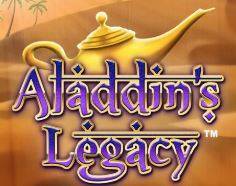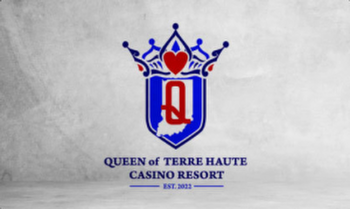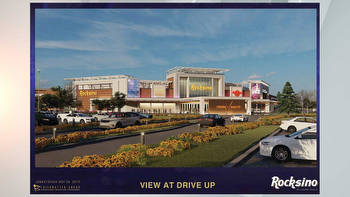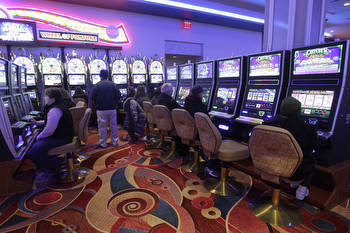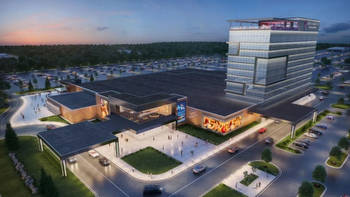Mark Bennett: As casinos' reliable base ages, industry tries to reach out

Motorists on Interstate 70 will start steering their vehicles onto an exit and into a new Terre Haute casino in late 2022 or early 2023.
Others will drive the streets and county roads of Vigo County from their homes and workplaces and into the gaming complex — the newly selected Queen of Terre Haute Casino Resort, operated by Louisville's Churchill Downs.
The Indiana Gaming Commission unanimously voted on Wednesday night to grant Churchill Downs Inc. a license to operate a Terre Haute casino. Churchill Downs estimates construction will take 12 to 16 months.
Churchill Downs plans to locate the $240-million facility on Honey Creek Drive west of Haute City Center mall, near the I-70 exit at U.S. 41, but isn't ruling out a shift to the city's east side near the I-70 exit at Indiana 46 — where most Hauteans expected a casino to be placed.
Either could be equally beneficial, though. A casino sited west of the mall would add urgency to community plans to enhance the nearby Wabash riverfront area along the vacant southside industrial corridor and bring more recreation and entertainment outlets to that locale. The Queen City of Terre Haute's venues could face the river, instead of the wastewater treatment plant and new county jail. It also would pressure elected officials to keep those two necessary public facilities from inhibiting surrounding developments, just as they've long promised.
Likewise, an eastside casino could stir further business expansion in that growing city sector, where infrastructure is already in place for such a gaming complex.
Whichever I-70 exit the casino abuts, its steadiest flow of patrons may predominantly from the Baby Boom Generation (people born between the post-World War II era and The Beatles' invasion of America) and the Silent Generation (folks born between 1925 and '45).
The variable could be the younger crowd — Millennials (born between 1981 and '97) and Generation Z (adults under age 24).
The average age of land-based-casino gamblers is 51.2 years, according to statistics cited in a 2019 report by sports and lifestyle website FootBasket. By contrast, the average age of internet gamblers — such as those betting on sports from their smartphones — skews younger at 45.7 years.
It's a pivotal question for the casino industry, which is trying to appeal to generations that favor video games, online gambling and entertainment outlets that feature social interactions, rather than solitary stays at a slot machine or card table.
The industry's struggle to attract younger generations into casinos was a topic discussed at last month's East Coast Gaming Congress, a top-level gambling conference in Atlantic City, N.J. Tactics such as e-sports (highly competitive video games), sports betting and electronic table games have generated mixed results, conference attendees told The Associated Press. Casinos' challenge is adapting their offerings to the desires of Millennials and Gen Z-ers, like games involving skill rather than chance and live entertainment at casino venues.
Similar concerns were reflected in Spectrum Gaming Group's 2019 study "Comprehensive Gaming Industry Analysis" for the state of Louisiana.
"Casino operators are concerned about generational change, specifically that — as their current base of mostly older players dies out — they will not be replaced by younger players," the Spectrum report stated. "The next generation has less interest in slots and table games, and is more attracted to casinos for the nongaming entertainment, food and beverage.
A new Terre Haute casino may see its prime competition coming from planned casinos in neighboring Illinois — one projected for Danville would be an hour's drive away — or elsewhere in Indiana. It goes beyond that, though.
"The biggest competition is not going to come from other casinos," Ed Feigenbaum, editor of Indiana Gaming Insight, said in a phone interview Monday. "It's going to come from other sources of discretionary spending on entertainment." Those options could be plays at the local theaters, sporting events, vacations, concerts, dining-out experiences or streaming movies.
Forty-and-under adults who expend money on gambling often favor competing in online video games or sports betting, if they go to a casino. They might go to casino music shows, if the artists are recognizable to their generation. Their parents or grandparents who gamble, by contrast, enjoy playing the slots or table games, and they remain a stable clientele for casinos, for now. The younger Millennials now outnumber Boomers.
"The situation that you have is that the Baby Boomers' generation is dying out," Feigenbaum said.
As for Gen Z-ers and Millennials, "They want some kind of interactive gaming," he added. "They want gaming that's fast-paced. They want gaming they can play with their colleagues and friends. And the industry is trying to cater to that."
Indeed, Churchill Downs believes the amenities planned for its Terre Haute casino will bridge that generation gap.
"The Queen of Terre Haute will be filled with multiple entertainment offerings like live music, contemporary food and beverage products and, of course, a state-of-the-art TwinSpires sportsbook [online wagering] as a centerpiece of the gaming floor, that will be sure to attract multiple generations," Wade West, Churchill Downs senior director of marketing, said by email Friday. "Beyond the gaming experience, the amenities offered throughout the hotel, including the rooftop pool and bar, will be especially appealing to young professionals across the entire region."
Of course, it should noted that the entire Wabash Valley population doesn't intend to gamble at the casino or want young adults to do so.
Only 25% of Americans gambled in a casino over the previous 12-month period, according to the state of Ohio's "Play It Safe" website for problem gamblers. And, gambling addictions are a real problem, particularly in casino communities. About 10 million Americans have a gambling addiction, the North American Foundation for Gambling Addiction Help states. Six percent of U.S. college students have a serious gambling problem, according to the International Center for Responsible Gaming's CollegeGambling.org website. So, community addictions and mental health services will be even more crucial.
And, economists remain skeptical that casinos drive growth in a local economy, beyond the short-term construction jobs and tax revenues pumped into government and civic projects.
The downsides shouldn't be ignored.
An estimated 6.7 million visitors will come to the casino in its first five years. No matter their age, this community can help make sure they see Terre Haute in a positive light, enticing them to return and also explore other businesses, parks and events.
If so, this town comes out ahead.







